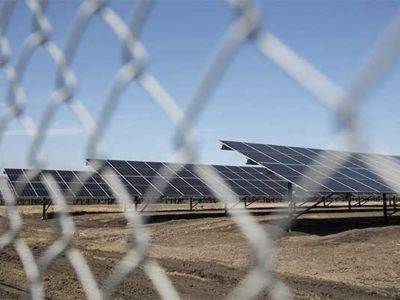RIVERSIDE, Calif. — With a new 7.5-megawatt (MW) solar energy farm located on the city’s former Tequesquite Landfill now operational, Riverside’s total solar generation has soared past the 20-MW mark – five years ahead of schedule.
“Riverside reaching the 20-megawatt milestone is especially impressive because it was not too long ago that one megawatt was an ambitious goal,” Mayor Rusty Bailey said. “The fact that we are reaching 20 megawatts five years ahead of schedule speaks volumes about our commitment to green energy and sustainability.”
Formed in 2005 by Bailey’s predecessor Ronald O. Loveridge, the Clean & Green Task Force, made up of local leaders and city personnel, looked for ways to improve the city’s appearance while making city practices more sustainable and improving air quality.
Among the goals the task force recommended was to install at least 20 MW of solar energy generation within the city by 2020. The new 7.5-MW Tequesquite Landfill solar farm, created in partnership with Riverside Public Utilities (RPU) and SunPower (Nasdaq: SPWR) helped the city reach, and surpass that 20-MW goal.
“We’ve come a long way from our first solar generation project [a carport shade system at the Utilities Operation Center constructed in 2001] to the nearly 1,700 systems that are online in Riverside today,” said the City’s Sustainability Officer Michael Bacich.
“We commend the City of Riverside for its leading commitment to solar, including this very significant 7-megawatt power plant, which takes good advantage of an otherwise underutilized former landfill site,” said Howard Wenger, SunPower president, business units. “Solar is mainstream and cost-competitive with traditional energy sources today, and can help fiscally responsible agencies reduce electricity costs to better serve their constituencies.”
The high performance Tequesquite Landfill solar farm is powered by SunPower solar panels, the most efficient solar panels available on the market today.
SunPower built the system as part of a 25-year power purchase agreement under which Riverside Public Utilities will buy the power generated by the plant at rates that are competitive with retail electricity, minimizing the effect of rising electricity costs. The system is owned by 8Point3 Energy Partners LP (Nasdaq: CAFD), the YieldCo joint venture formed by SunPower and First Solar. The City of Riverside is retaining the renewable energy credits associated with the system.
Initially, solar projects in Riverside were funded by RPU and placed on city sites including low-income housing; senior centers; pool facilities, and even atop city hall, until RPU began its residential solar rebate program in 2003 and commercial rebate program in 2008.
Participation was sluggish at first, but by 2012 Riverside solar projects were generating over 5 MW, which grew to 10 MW just two years later. As technologies improved, costs lowered, and additional incentives from the state became available, participation levels grew exponentially. So much so that for the past two years RPU’s solar fund reservations have closed within the first day they come available.
Established in 1895, Riverside Public Utilities is a consumer-owned water and electric utility governed by a board of nine community volunteers that provides high quality, reliable services to over 107,000 metered electric customers and up to 65,000 metered water customers throughout the City of Riverside. The Utility is committed to increased use of renewable energy resources and sustainable living practices that help reduce environmental impacts within the City of Riverside and the state of California.
About SunPower Corp.
SunPower Corp. (NASDAQ: SPWR) designs, manufactures and delivers the highest efficiency, highest reliability solar panels and systems available today. Residential, business, government and utility customers rely on SunPower’s 30 years of experience and guaranteed performance to provide maximum return on investment throughout the life of the solar system. Headquartered in San Jose, Calif., SunPower has offices in North and South America, Europe, Australia, Africa and Asia.














Comments